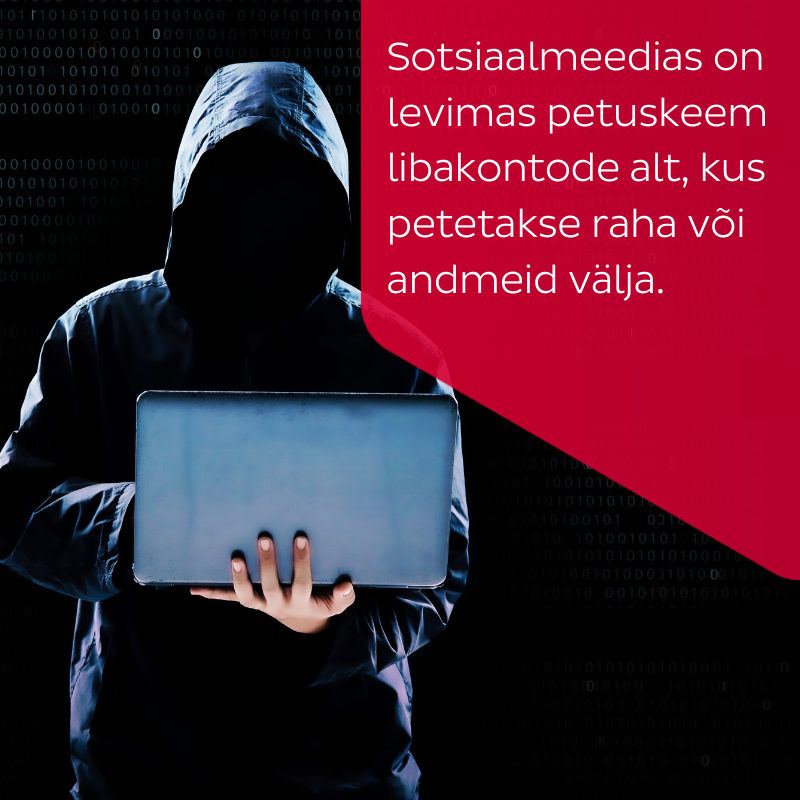How to recognize fraudulent messages and phishing attempts?
We ask everyone to be careful in recognising fraudulent messages and phishing attempts seemingly spread by DPD, but with which DPD has no connection. Sending phishing emails and Marketplace platforms on social media are mainly used to carry out frauds. In these cases, the aim is to persuade the victim to transfer money or insert their credit card details.
Phishing emails
The email is seemingly sent by DPD, but the sender’s email address is unknown. You should be sceptical about every message which asks to transfer money. Official DPD messages only arrive from email addresses ending in dpd.ee, @dpdgroup.com and @geopost.com. DPD does not ask for personal information, personal bank details or money transfer via email.
Fraudulent schemes on social media platforms
Fraudulent schemes are also spreading on social media platforms, where frauds pose as Marketplace buyers and claim they would pay for the service via DPD or ask the seller to pay for additional insurance. Scammers often want to quickly transfer the communication to social apps such as WhatsApp, where the conversation can be deleted later. The schemes are constantly getting more intricate, and the grammar of the messages is getting better.
How to protect yourself from fraud?
-
Do not share your credit card details or PINs with strangers.
-
Do not share your contact information (email, phone number, address) on social media with strangers or if the buyer’s account raises suspicion.
-
Be cautious and verify the email address from which the message was sent. If the email does not arrive from an email address ending in @dpd.ee, @dpdgroup.com or @geopost.com, it is an email fraud. DPD does not send emails from other addresses (e.g., @gmail.com, @hotmail.com and other such domains).
-
Pay attention to the spelling and content of the letter. Be thorough when reading the letter or visiting the website, there are often many spelling mistakes and the word usage is unclear.
-
DPD does not ask for extra fees for insurance or other additional services. The recipient will only pay for a parcel if they have ordered it with the Cash-on-Delivery service. In the case of a Card-on-Delivery parcel, we always send an SMS to the recipient, stating the exact sum which must be paid upon delivery. If you do receive a Card-on-Delivery parcel from DPD, this must be paid for upon receipt directly to the courier or at the parcel locker.
-
If you suspect that you have been sent a fraudulent email, do not open any links or attachments sent with the message.
If you suspect that someone is trying to phish your data, you can always contact us via e-mail [email protected] or by phone 613 0012.
How to recognize fraudulent messages and phishing attempts?


We ask everyone to be careful in recognising fraudulent messages and phishing attempts seemingly spread by DPD, but with which DPD has no connection. Sending phishing emails and Marketplace platforms on social media are mainly used to carry out frauds. In these cases, the aim is to persuade the victim to transfer money or insert their credit card details.
Phishing emails
The email is seemingly sent by DPD, but the sender’s email address is unknown. You should be sceptical about every message which asks to transfer money. Official DPD messages only arrive from email addresses ending in dpd.ee, @dpdgroup.com and @geopost.com. DPD does not ask for personal information, personal bank details or money transfer via email.
Fraudulent schemes on social media platforms
Fraudulent schemes are also spreading on social media platforms, where frauds pose as Marketplace buyers and claim they would pay for the service via DPD or ask the seller to pay for additional insurance. Scammers often want to quickly transfer the communication to social apps such as WhatsApp, where the conversation can be deleted later. The schemes are constantly getting more intricate, and the grammar of the messages is getting better.
How to protect yourself from fraud?
-
Do not share your credit card details or PINs with strangers.
-
Do not share your contact information (email, phone number, address) on social media with strangers or if the buyer’s account raises suspicion.
-
Be cautious and verify the email address from which the message was sent. If the email does not arrive from an email address ending in @dpd.ee, @dpdgroup.com or @geopost.com, it is an email fraud. DPD does not send emails from other addresses (e.g., @gmail.com, @hotmail.com and other such domains).
-
Pay attention to the spelling and content of the letter. Be thorough when reading the letter or visiting the website, there are often many spelling mistakes and the word usage is unclear.
-
DPD does not ask for extra fees for insurance or other additional services. The recipient will only pay for a parcel if they have ordered it with the Cash-on-Delivery service. In the case of a Card-on-Delivery parcel, we always send an SMS to the recipient, stating the exact sum which must be paid upon delivery. If you do receive a Card-on-Delivery parcel from DPD, this must be paid for upon receipt directly to the courier or at the parcel locker.
-
If you suspect that you have been sent a fraudulent email, do not open any links or attachments sent with the message.
If you suspect that someone is trying to phish your data, you can always contact us via e-mail [email protected] or by phone 613 0012.

